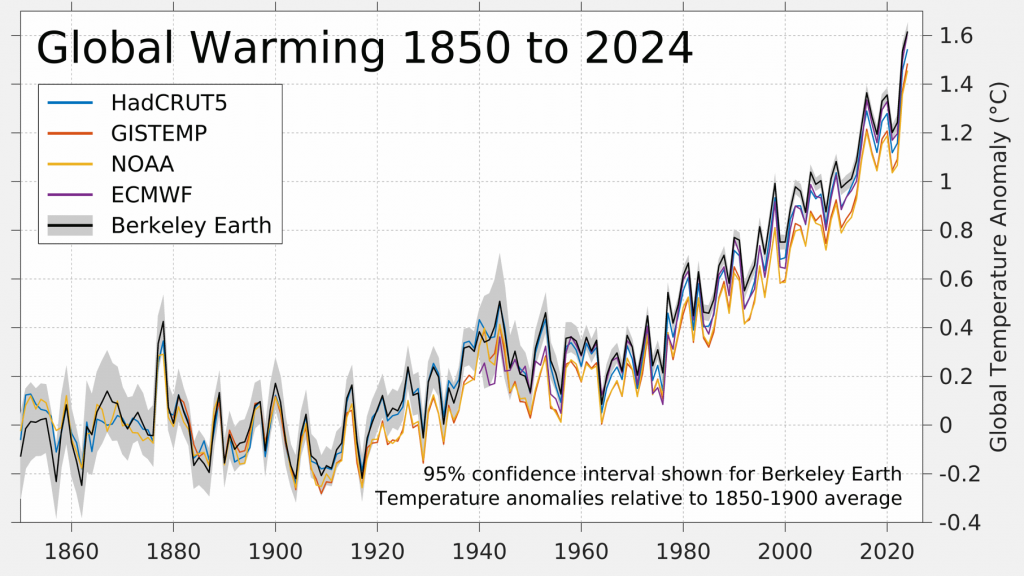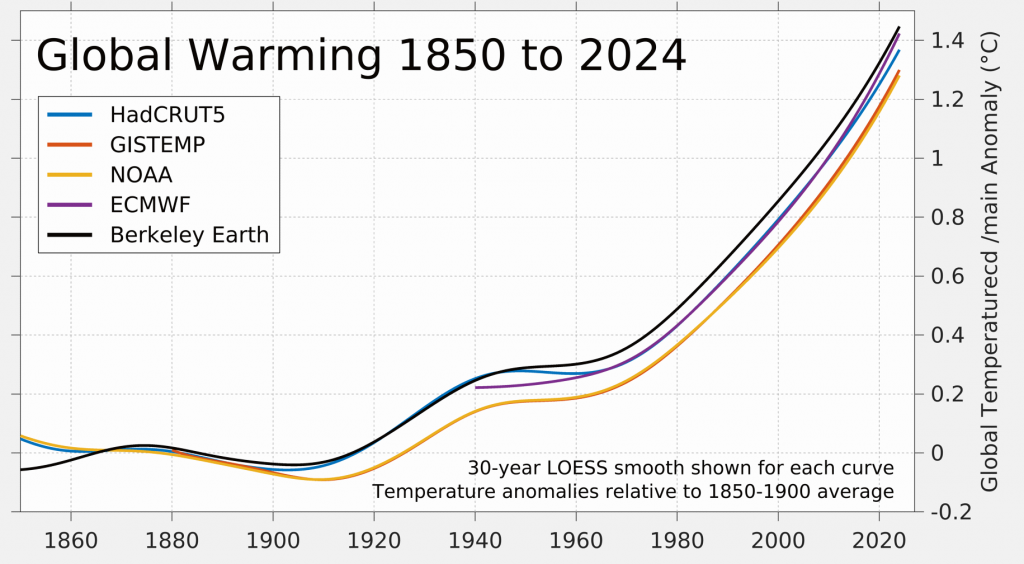Title: Re: Berkeley 2024 Climate Report 2024 Pt 6
Post by Jovial Monk on Jan 21st, 2025 at 8:44pm
Quote:Future Long-term Trend
Though it is interesting to understand the characteristics of individual years, global warming is ultimately about the long-term evolution of Earth’s climate. The exceptional nature of the warming in 2023/2024 makes future forecasting more difficult, since it likely points to a deviation from the historical trend.
Since 1980, the overall trend has been about +0.20 °C/decade (+0.36 °F/decade). The extreme warmth in 2023/2024 likely points to a period of greater warming. However, whether that greater warming rate persists over the long-term or is only present briefly is hard to predict. To the extent that excess recent warming is likely driven by reductions in man-made aerosol pollution, future warming from this source will also depend directly on human choices regarding the regulation of such aerosols.
That said, our long-term trend estimate (a 30-year LOESS smooth) has already crossed 1.4 °C (2.5 °F) above the average temperature from 1850-1900. Given recent rates of warming is may take only ~5 years for our long-term trend to reach 1.5 °C (2.7 °F).
The Paris Agreement on Climate Change aims to keep the long-term average global temperature rise to well below 2 °C (3.6 °F) and encourages parties to strive for warming of no more than 1.5 °C (2.7 °F). It has been clear for sometime that the 1.5 °C (2.7 °F) goal will not be achieved. Too little time remains and efforts at mitigation fall far short of what would have been needed to meet that target.
Nonetheless, effective mitigation can still limit global warming and reduce the severity of negative outcomes. The increasing abundance of greenhouse gases in the atmosphere due to human activities is the primary cause of recent global warming. If the Paris Agreement’s goal of no more than 2 °C (3.6 °F) warming is to be reached, significant progress towards reducing greenhouse gas emissions needs to be made soon.
Global Mean Temperature Prediction for 2025
Based on historical variability and current conditions, it is possible to roughly estimate what global mean temperature might be expected in 2025. Our current estimate is that 2025 is likely to be cooler than 2024. With the end of the 2023/2024 El Niño and the shift towards a weak La Niña, it is likely that 2025 will cool relative to 2024 and 2023. As a result, we expect that 2025 will be roughly the 3rd warmest year in the instrumental record. However, the newly formed La Niña is expected to be weak, and a return to El Niño by the end of 2025 is possible. The swings from El Niño to La Niña and back again are the largest source of predictable interannual variability in the global temperature record.
Estimated probabilities of annual average rank in 2025:
1st place: 6%
2nd place: 19%
3rd place: 63%
4th – 6th place: 11%
7th place or lower: 1% |
|
 https://berkeleyearth.org/wp-content/uploads/2025/01/GroupCompareEarlyBase-1024x576.png https://berkeleyearth.org/wp-content/uploads/2025/01/GroupCompareEarlyBase-1024x576.pngSmoothed:  https://berkeleyearth.org/wp-content/uploads/2025/01/GroupCompareSmooth-1024x564.pnghttps://berkeleyearth.org/global-temperature-report-for-2024/ https://berkeleyearth.org/wp-content/uploads/2025/01/GroupCompareSmooth-1024x564.pnghttps://berkeleyearth.org/global-temperature-report-for-2024/
|